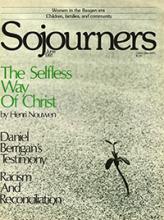Last Sunday as we were settling in before community worship was to begin, the person next to me turned and said, quite seriously, "Judi, I have a small bruise on my arm." Then she smiled and added, "Just kidding!" We laughed together. It was a brief interchange, but one I'll remember for a long time; it epitomizes for me what it means to be Sojourners Fellowship's resident nurse.
For one thing, it means always being on call, and the calls come at any time and all times--mealtime, bedtime, worship time, party time. No time or place is holy. I've been interrupted while praying in our poustinia to answer an "urgent" phone call, spent "passing the peace" during Sunday worship examining someone's cut finger, and at our Wednesday night community meetings I've looked in many an ear and given a multitude of allergy injections.
Given the busyness of our lives, connecting with another Sojourner for even the simplest thing requires a great deal of flexibility. Recently I arranged to give a community member a tuberculin skin test one morning before work. We chose a day when he would be at my house for a tenant organizers' meeting. It takes a lot of grace to give a skin test without disrupting a meeting. After a few whispered instructions, he rolled up his sleeve and had his test, never dropping his conversation.
I'm coming to expect the unexpected. Whether removing sutures from George (one of the community's cats), drawing blood from someone at the dining room table while people wander in and out with their breakfast, making a house-call to diagnose chickenpox, or trying to inconspicuously carry a full urine bottle back to the clinic where I put in regular hours, life is never dull.
Read the Full Article

